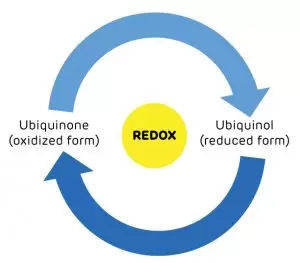
Introduction
Are you facing such symptoms? Symptoms like fatigue, muscle weakness, and shortness of breath often taken as a sign of getting old. Most of the people did not know that all these symptoms are showing that the body is facing coenzyme Q10 (CoQ10) deficiency. The level of CoQ10 in the body decrease as we age. CoQ10 concentrations are at the highest during the first 20 years of life, after which, it begins to decline.
CoQ10 is a fat-soluble, vitamin-like compound that naturally found in most tissue of the human body. There are two forms of CoQ10: ubiquinone and ubiquinol. They interconverted according to body needs. CoQ10 plays a vital role in the production of energy within the cell and has powerful antioxidant activity. CoQ10 is found naturally in our diets from foods, including fish, liver, kidney, and the germs of whole grain. Although it can be obtained from certain foods, foods tend to supply a low dose, which supplementation might be a choice to gain benefits from CoQ10. ‘

Figure 1: Ubiquinone is in high demand during energy production; while ubiquinol is the antioxidant circulating all over the body.
CoQ10 help to convert raw energy from foods (carbohydrates and fats) into the form of energy that our body cells use known as adenosine triphosphate (ATP) by playing a role in “mitochondrial ATP synthesis.” This conversion process requires the presence of CoQ10 in the inner mitochondrial membrane. The process of making ATP is crucial to every cell in the human body and allow messages to be sent between cells.
All the organs require energy to function; the energy demands of specific organs are higher than the others. Being the most hardworking organ which beats ceaselessly throughout our life, a high amount of CoQ10 found in the heart. When insufficient energy supplied to the heart muscle, the heart might be unable to pump as well as it should be. Researchers revealed that CoQ10 supplementation assists in heart-related conditions. Heart failure and abnormal heart rhythms often characterized by energy depletion status resulting from reduced CoQ10 levels in the body.
Free radicals are produced regularly in the body as a by-product of natural metabolic process or through exposure to environmental toxins such as ultraviolet light, tobacco smoke, and air pollutants. By acting as an antioxidant, CoQ10 could scavenge free radicals and protects cells from oxidation. Hence, it could provide many protective effects. For example, it could inhibit the oxidation of LDL cholesterol, which is one of the critical processes in the development of atherosclerosis. Atherosclerosis can result in a higher risk of heart attack and stroke. CoQ10 may benefit the cardiovascular system through its antioxidant and anti-inflammatory effects and by improving blood vessel function.
Statin is a cholesterol-lowering drug. It reduces cholesterol levels by blocking an enzyme pathway involved in the production of cholesterol. However, this pathway also produces CoQ10. Thus, prolonged consumption of statin drug could reduce the production of CoQ10 in the body, results in symptoms like muscle weakness and tiredness. It is evident that CoQ10 is a critical ingredient in energy production and its deficiency affect energy production in the cells, resulting in all these symptoms.
Also, it could enhance the antioxidant potential of other antioxidants in the body, such as vitamin C and E. CoQ10 is also needed to regenerate vitamin E after it has neutralized a free radical. Furthermore, CoQ10 could help to improve both male and female fertility. It has been shown that CoQ10 supplementation increased sperm density, motility, and morphology. The egg quality could be improving with the supplementation of CoQ10.
Presently, there are no established daily dietary intake recommendations for CoQ10. Some researchers suggest daily doses of 30 to 200mg of CoQ10 for adults 19 years old and above; 100-200mg daily is recommended for elderly and statin users. In summary, CoQ10 benefits not just the heart, but the whole body.
back


